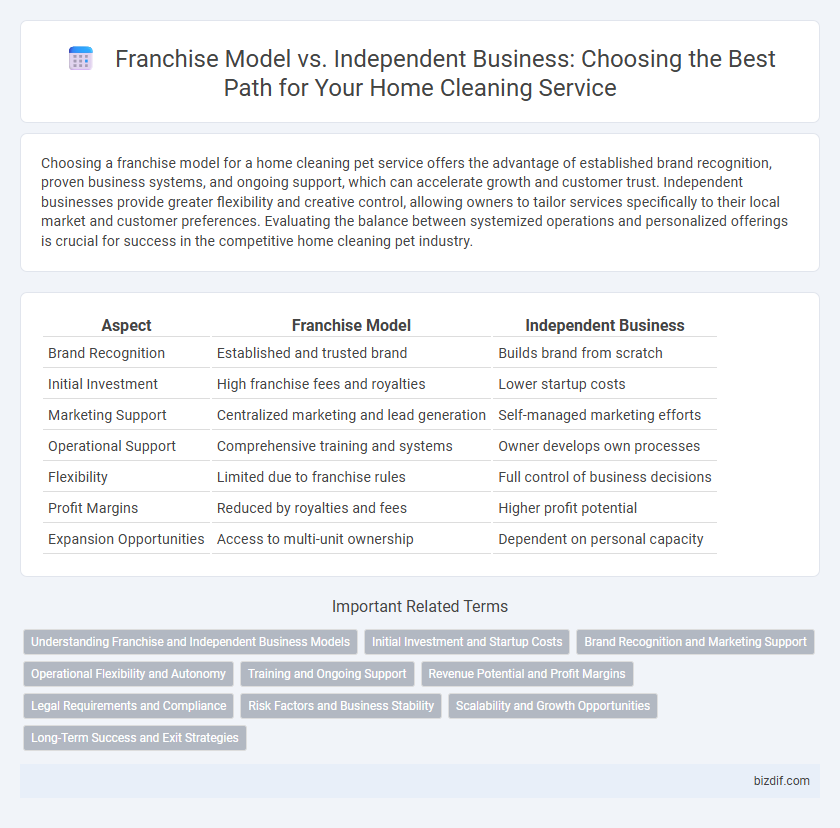Choosing a franchise model for a home cleaning pet service offers the advantage of established brand recognition, proven business systems, and ongoing support, which can accelerate growth and customer trust. Independent businesses provide greater flexibility and creative control, allowing owners to tailor services specifically to their local market and customer preferences. Evaluating the balance between systemized operations and personalized offerings is crucial for success in the competitive home cleaning pet industry.
Table of Comparison
| Aspect | Franchise Model | Independent Business |
|---|---|---|
| Brand Recognition | Established and trusted brand | Builds brand from scratch |
| Initial Investment | High franchise fees and royalties | Lower startup costs |
| Marketing Support | Centralized marketing and lead generation | Self-managed marketing efforts |
| Operational Support | Comprehensive training and systems | Owner develops own processes |
| Flexibility | Limited due to franchise rules | Full control of business decisions |
| Profit Margins | Reduced by royalties and fees | Higher profit potential |
| Expansion Opportunities | Access to multi-unit ownership | Dependent on personal capacity |
Understanding Franchise and Independent Business Models
Franchise models in home cleaning provide established brand recognition, standardized training, and proven business systems, ensuring consistent service quality and operational support. Independent businesses offer greater flexibility, control, and the ability to tailor services to local market demands, but require the owner to manage all aspects of marketing, operations, and customer acquisition. Understanding these models helps entrepreneurs choose between the security of a franchise's structured framework and the autonomy of an independent venture in the home cleaning industry.
Initial Investment and Startup Costs
Franchise models in home cleaning typically require a higher initial investment, ranging from $20,000 to $50,000, which covers franchise fees, training, and brand licensing. Independent businesses have lower startup costs, often under $10,000, mainly spent on equipment, supplies, and marketing. While franchises provide established brand recognition and support, independent ventures offer more flexibility with lower financial risk during startup.
Brand Recognition and Marketing Support
Franchise models in home cleaning offer strong brand recognition, enhancing customer trust through established reputations and consistent quality standards. They provide comprehensive marketing support, including national campaigns, digital advertising, and branded materials that drive lead generation and client acquisition. Independent businesses often lack these resources, requiring more investment in local marketing efforts to build visibility and attract clients.
Operational Flexibility and Autonomy
Franchise models in home cleaning offer structured operational procedures and brand support, limiting flexibility but ensuring consistent service delivery. Independent businesses enjoy greater autonomy, allowing tailored scheduling, pricing, and service customization to meet local customer demands. Operational flexibility in independent cleaning services fosters innovation and quick adaptation to market trends, unlike franchise systems bound by standardized protocols.
Training and Ongoing Support
Franchise models in home cleaning offer comprehensive training programs and continuous support systems, ensuring consistent service quality and operational efficiency across locations. Independent businesses often develop personalized training methods but may lack the extensive resources and structured support found in franchises. Access to franchisor expertise, marketing tools, and standardized protocols enhances franchisees' ability to maintain high customer satisfaction and adapt to market changes effectively.
Revenue Potential and Profit Margins
Franchise models in home cleaning offer higher revenue potential through brand recognition and established customer bases, often leading to more consistent income streams. Independent businesses typically experience varied profit margins due to flexible pricing strategies and lower overhead costs but face challenges in market penetration and customer acquisition. Evaluating local market demand and operational efficiencies is crucial to maximizing profitability in both frameworks.
Legal Requirements and Compliance
Franchise models in home cleaning offer structured legal frameworks and standardized compliance protocols, ensuring alignment with federal and state regulations such as OSHA and EPA guidelines. Independent businesses must individually navigate local licensing, insurance mandates, and labor laws, which can vary significantly by jurisdiction. Adhering to these legal requirements is crucial for both models to avoid penalties and maintain operational legitimacy.
Risk Factors and Business Stability
Franchise models in home cleaning offer reduced risk factors due to established brand recognition, proven operational systems, and ongoing corporate support, enhancing overall business stability. Independent businesses face higher risks from market entry uncertainties, variable customer acquisition, and the burden of creating effective marketing strategies without a strong brand. Stability in a franchise is often bolstered by shared resources and collective buying power, whereas independent cleaners must manage all operational aspects independently, increasing vulnerability to market fluctuations.
Scalability and Growth Opportunities
Franchise models in home cleaning offer scalable growth through established branding, proven systems, and access to national marketing resources, accelerating expansion into new markets. Independent businesses benefit from greater operational flexibility and lower entry costs but face challenges scaling without the support of a recognized brand or structured growth framework. Evaluating franchise fees against potential for rapid market penetration is crucial for ambitious entrepreneurs targeting long-term scalability and profitability.
Long-Term Success and Exit Strategies
Franchise models in home cleaning offer established brand recognition and proven business systems, facilitating faster growth and easier scalability for long-term success. Independent businesses provide greater flexibility and control, allowing owners to tailor services and build unique brand loyalty but may face higher risks and challenges in market penetration. Exit strategies differ significantly; franchises often benefit from smoother resale opportunities due to brand value and corporate support, whereas independent businesses rely heavily on personal reputation and asset valuation for successful sale or succession.
Franchise model vs Independent business Infographic

 bizdif.com
bizdif.com